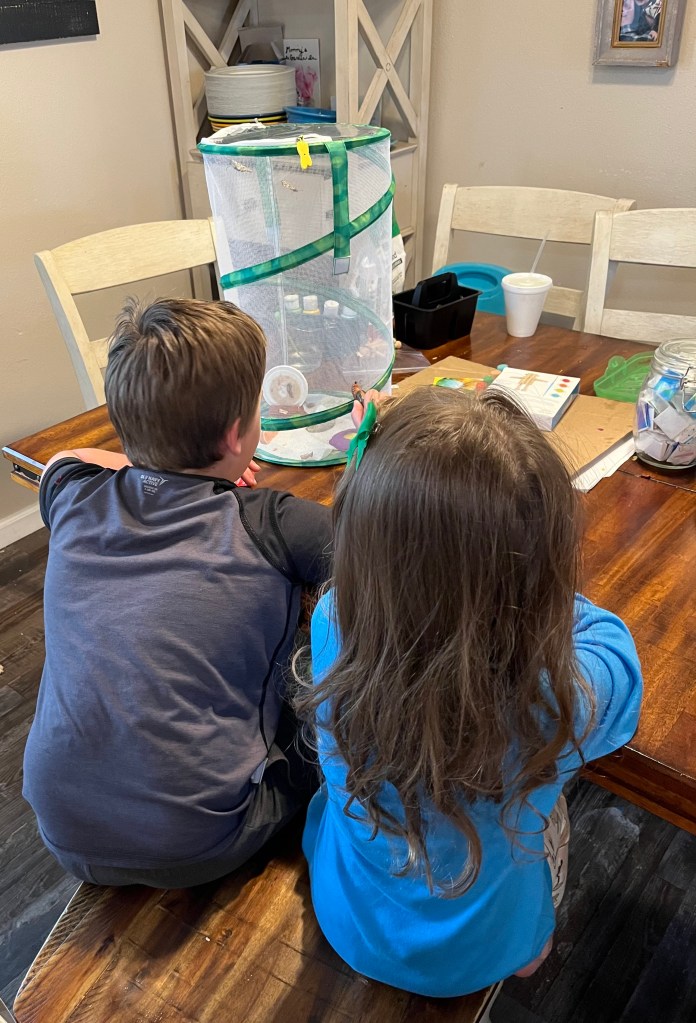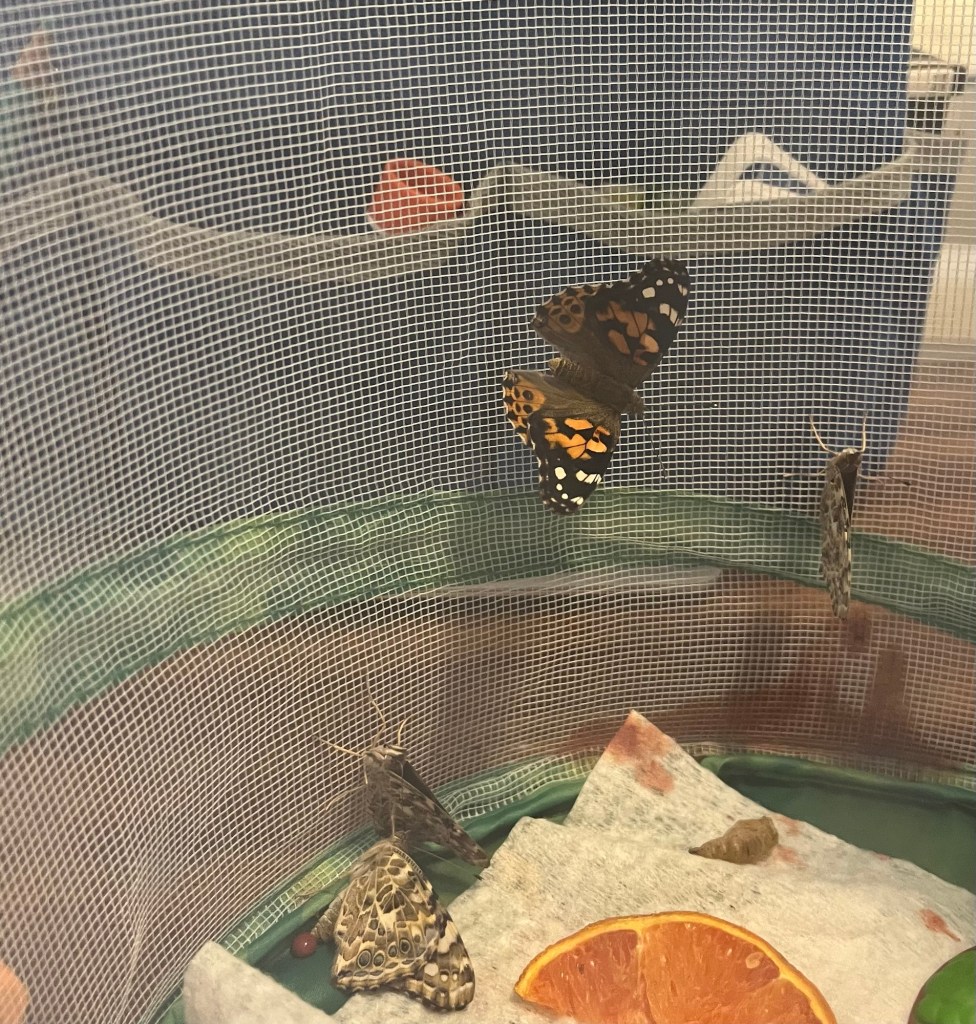I don’t know if you see what I see, but there it is every time I use the bathroom, wipe a bottom that doesn’t belong to me, or just sit on the lid for a few minutes to pray without the clamor of little hands touching me.
It stares at me like a dare, a little scribble (In permanent marker), that conspicuously looks like “joy,” Apparently toddler height aligns perfectly with my eyes if I’m sitting on the toilet.
The scribbled “joy” demands my attention beckoning me to stop and assess my heart. More than once I’ve stared blankly at it asking “Where is joy today? What does it look like?”
As a 20 something, single, longing for a husband and children (while seemingly everyone else received those gifts), sometimes finding joy was a fight.
As a 30 something, reeling after the death of a husband finding joy was an all out war.
As 40 something, thick in the hands full days of sticky floors and yogurt spills, of endless needs to meet, of constant sibling squabbles, of rocking a sobbing three year old who desperately wants his red pants (but Mommy can’t give him what’s down in the laundry), sometimes joy is a battle.
My life is full of good gifts. Gifts that I’ve prayed long for, gifts I enjoy immensely. But they are also gifts that demand extensive time and energy. They are gifts with their own minds and emotions. They are gifts that are sometimes agents of destruction. They are gifts who all need me at the same time. A sage friend aptly described the little years as “sweet and suffocating.”
There isn’t a life altering crisis in our lives right now, but this Christmas season joy has been illusive, trying to slip through my fingers like water. Stress upon stress leaves me feeling like I’m bailing out a sinking ship with a bucket that has holes in it. I’m using a broom to push the ocean away from the shore.
I haven’t struggled for joy at Christmas this deeply since the immediate years following Jon’s death. That’s saying something.
We’ve done all the Christmas things- lights and hot chocolate, made ornaments and cookies, decorated the tree, watched the movies. Our book basket overflows with all my favorite Christmas books. These usher happiness for a time. But it’s like smoke against the deeper struggle. Anyone else notice the immense pressure and emphasis our culture puts on “Christmas magic?” Don’t get me wrong. I love all the special things. But this year they brought only fleeting joy.
So I find myself crying out, “Lord fill my heart with joy. Burst onto the scene. Help my unbelief.”
I think we deceive ourselves that a day will come when we won’t have to fight for joy, when life is less hard. Or less overwhelming.
When I have children, I won’t have to fight for joy.
When I make more money, I won’t have to fight for joy.
When I’m understood…
When I am known…
When I lose twenty pounds…
When my house stays clean and tidy…
Feel free to fill in your own blank also.
But on this side of the new heavens and the new Earth, “hard” is a fact of life, and sometimes we must fight for joy because circumstances and emotions lob grenades at us. Of course, there are breezy days with oceans and gorgeous sunsets. Of course there are days when joy is accompanied by happiness, with light feelings and oxytocin.
But is joy separate from emotion? Can it endure even when I don’t feel particularly sparkly and bubbly? Can it endure even when I kneel on the floor tears flowing, sobs forming, panic brewing?
Yes, I think it can.
I have experientially learned this to be true in other seasons. Now I recall it to be true in this season.
Joy is a confident, settled attitude of the heart that blossoms from trust and rest in God. It’s not dependent on circumstances or emotions. It’s deeper than happiness.
I want this so badly. I want the state of mind that knows, “all will be well” because I know God is good. And I want joy’s close cousins—peace that passes understanding, and hope, the confident expectation that God will do what he says he will do.
So what can we do when emotions shout otherwise? When we want happiness and joy to coincide but they don’t?
Seek it. Pray for it. Ask God to fill your heart with it. Recall your blessings. Repeat truth even when emotions scream the opposite. Remember what has gone before.
I heard another wise friend tell her seven year old, “Your emotions are real, but they aren’t always honest.”
Fight.
“Fear not, for behold, I bring you good news of great joy that will be for all the people! For unto you is born this day in the city of David a Savior, who is Christ the Lord!” (Luke 2)
Great joy! It’s there. It’s possible to know it. Maybe, just maybe if we keep recalling truth, our emotions will eventually catch up.
And if they don’t, perhaps in the season of Advent, the struggle for joy is entirely appropriate. Before that very first Christmas, the world full of gloom, groaning, waiting. God had been silent for 500 years. But finally Jesus came, right in the middle of the mess and muck. When his cry rang out, the Light of the World pierced the darkness changing the world and the course of history forever.
But you know what, the world didn’t know it yet. The immediate darkness didn’t change yet.
Mary was still a woman with a very real recovery after giving birth. There was still blood upon blood and pain upon pain. There were still cracked, bleeding, sore nipples as she learned to nurse her son. There was still a wound the size of a dinner plate in her uterus.
She and Joseph were still far from home. Perhaps Mary was attended to by Joseph’s relatives or Bethlehem’s midwives, but her own mother wasn’t there.
And 40 days after giving birth, they took a little jaunt over to Jerusalem to present Jesus at the temple. But their finances hadn’t changed. They still had to give a pauper’s sacrifice, two turtle doves instead of a lamb.
She gave birth to the one who was Great High Priest and perfect lamb, but she still had to offer a sacrifice! The veil had not yet been torn, and she was still far removed from God.
And then there’s Herod. Perhaps the threat was not yet there on the night Jesus was born, but at some point in his infancy or toddlerhood, Herod started murdering little boys. At some point Mary and Joseph fled with their child. Imagine that stress and trauma.
Mary and Joseph experienced utter delight at the birth of their new son. Great joy had indeed entered the world—I know that delight. I know experientially that the utter joy of new life makes the physical agony of childbirth fade to the background, forgotten as it were. Moments before birth, my body was on fire. But as soon as that first marvelous cry echoed, and the baby placed on my chest, excruciating pain gave way to glowing, radiant happiness.
Soon, however, amid the rapture and utter happiness real life came back.
When look around and see physical chaos around me, emotional chaos in my heart, worries and fears that creep in, the stress that threatens to drown me—I recall, this is what Jesus came for.
He came down right in middle of the mess and muck. He came for the days you don’t feel sparkly, bubbly, or radiant with happiness.
So friend, fight for joy. You can’t be passive. We can’t expect temporal pleasures to give us what’s of an eternal nature- lasting, permanent joy.
But I know the author of permanent joy.
“But this I call to mind and therefore I have hope, the steadfast love of the Lord never ceases, great is your faithfulness.” (Lamentations 3)
Our confident expectation is in the God who created us, pursued us, purchased us back, and won us through the blood of his Son.
I remember the joy and delight of intimacy with God. I “shall again praise Him.” Delight will come again. I remember that He is the Rock, the stability when waves toss me about.
I change. He changes not.
I remember who He is. By grace He enables the impossible—“Rejoice always.” But for grace through the accomplished work of Christ, that would be a crushing command. (I Thess 5:16-18)
I don’t rejoice always. I don’t always have an abiding attitude of trust, or take pleasure that all things in my life are according to God’s will.
But these things don’t depend on me. Jesus accomplished what I cannot. He rejoiced always. He gave thanks in all things. He prayed without ceasing. His performance is the standard, but it is also my standing.
Because I know the good news of Christmas, of Jesus himself, is real, I can rejoice. I can live with overflowing thankfulness and unceasing dependence.
When the Christmas season feels weighty, when sorrow mingles, when joy tries to slip away, remember what is true.
Jesus did indeed burst on the scene. He did indeed change the world. He did indeed change me.
So I quiet my noisy soul. I glance at a toddler’s scribble, “Yes, Lord. You are joy.”
Joy“May the God of hope fill you with all joy and peace as you trust in Him, so that you may overflow with joy by the power of the Holy Spirit.” (Romans 15:13)














